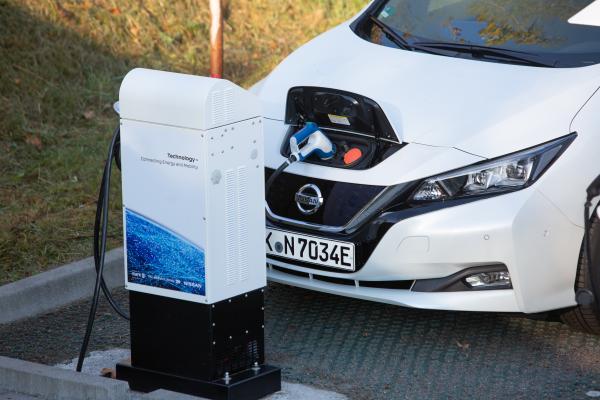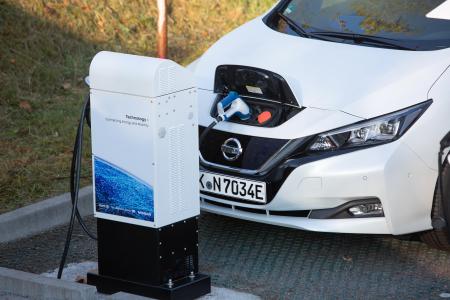
- EIB finances The Mobility House with €15 million to boost intelligent integration of electric vehicles into the power grid
- The loan is supported by the European Commission under ‘InnovFin Energy Demonstration Projects’ facility
- ChargePilot, The Mobility House’s Charging and Energy Management system, has proven a successful non-proprietary and open technology contributing to a zero-emission future
The European Investment Bank (EIB) and The Mobility House, a leading technology company and solution provider for charging services, have signed a €15 million financing agreement to promote the integration of electric vehicles into the energy markets. The loan will allow the Munich-based technology company to push ahead with the R&D for its intelligent Charging and Energy Management system ChargePilot, thereby supporting the rollout of electric vehicles along with their cost-effective and optimised integration into the power grid in Europe. The transaction is supported by the InnovFin Energy Demonstration Project facility, which is funded under the EU’s current research and innovation programme Horizon 2020.
Bidirectional charging, also known as vehicle-to-grid (V2G), can help drive the energy transition and pave the way for faster market penetration of both renewable energies and electric vehicles. Since cars spend a large part of their lives in the parking position, V2G creates significant added value by intelligently connecting electric cars to the power grid to provide various grid-stabilising services. While meeting all energy and data security requirements, The Mobility House’s ChargePilot offers a solution which enables smart charging and discharging of electric vehicles according to the grid’s needs. Currently, this is the only technology in the market which is non-proprietary and based on open standards to assure maximum scalability.
“Whilst e-mobility alone will not stop climate change, it is a powerful tool to help us limit the rise in global temperatures to sustainable levels,” said Ambroise Fayolle, EIB Vice President in charge of innovation. “The Mobility House has devised a technology with significant potential to make electric mobility more attractive and expand the use of renewable energies. As Europe’s climate bank, the EIB aims to support breakthrough ideas in the field, and we are glad to support a company with a zero-emission vision and the right tools at hand to turn it into reality.”
Mariya Gabriel, Commissioner for Innovation, Research, Culture, Education and Youth, said: “By 2050, electric vehicles could provide up to 20% of the flexibility required on a daily basis. This seems substantial, but technologies such as the one we are supporting today with Horizon 2020 prove that this ambition is attainable. All scenarios point to tremendous growth in electric vehicles so we need to seize this opportunity to the fullest and bring about the much needed energy transition.”
Thomas Raffeiner, founder and CEO of The Mobility House said: “The investment of the EIB attests to our vision. It shows that smart integrated electric vehicles are an essential solution for reaching our climate targets. We would like to thank the EIB for the trust they have shown our team and technology.”
Thanks to the EIB’s loan, The Mobility House will be able to strengthen its position in the international market further and make a decisive contribution to a future of sustainable energy. The funding supports activities in Germany, France, the Netherlands and other countries in Europe and promotes the expansion of renewables by allowing electric vehicles to be used for energy storage in the power grid and by making electric mobility cheaper. The company’s non-proprietary and open technology has already proven successful. It is used in several future-oriented applications, which have demonstrated the benefits of integrating electric vehicles into the energy system, reduced CO2 emissions considerably and highlighted the possibility for electric car owners to generate revenues.
Background information:
About The Mobility House
The goal of The Mobility House is to shape a future of emission-free energy and mobility. We integrate vehicle batteries into the power grid using intelligent charging and energy solutions. By doing so, we promote the development of renewable energies, stabilise the power grid and make electric mobility more affordable. The technology company was founded in 2009 and operates globally from its sites in Munich, Zurich and Belmont (California). We support our private and business customers on the path to electric mobility by helping them through the planning and building process as well as in the operation of an individual charging infrastructure. As a neutral supplier, we work with many partners including charging infrastructure manufacturers, installation companies, back-end system operators, energy suppliers and automobile manufacturers. ChargePilot, our intelligent Charging and Energy Management system, enables our customers and partners to integrate electric vehicles into the grid in a way that is both grid-optimised and future-proof. For more information, visit mobilityhouse.com.
About InnovFin financial and advisory products
Under Horizon 2020, the EU research and innovation programme for 2014-20, the European Commission and the European Investment Bank Group (EIB and EIF) launched a new generation of financial instruments and advisory services to help innovative firms access finance more easily. InnovFin – EU Finance for Innovators offers a range of tailored products, which makes available financing in support of research and innovation by small, medium-sized and large companies and the promoters of research infrastructures. The facility supports activities, which by their nature are riskier and harder to assess than traditional investments, and therefore often face difficulties in accessing finance.
About InnovFin Energy Demonstration Projects
This facility provides loans, loan guarantees or equity-type financing to innovative demonstration projects in the field of energy system transformation. The financing ranges between €7.5 million and €75 million and supports, amongst others, renewable energy technologies, smart energy systems, energy storage, carbon capture and storage or carbon capture and use. It helps the projects to bridge the gap between demonstration and commercialisation.

Photographer: Antonie Kerwien ©The Mobility House
Download original

Photographer: Antonie Kerwien ©The Mobility House
Download original